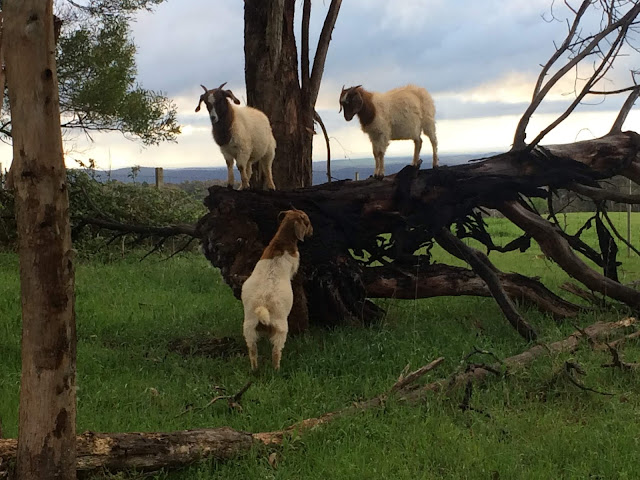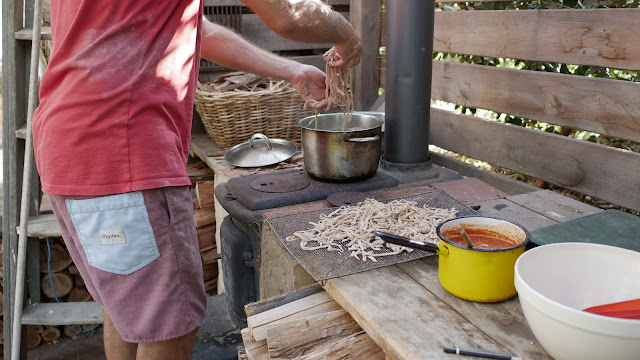The seven year old on the right in the below pic is Patrick, joined by his older brother Sam in 1977. They are on a camping trip with their father, Robert. On this night Robert (the photographer) lit a fathering fire after making a fire circle – an early rites of passage for his boys – and cooked a meal.
Four decades later Patrick and Meg light monthly fire circles and gather with community folk to listen deeply to one another and more-than-human life. Each circle, held within the Southwest community forest in the south of Djaara peoples' land, starts with a listening to country. In an unprecedented time of fear, anxiety and aggregating bushfire cycles, these fire circles provide opportunities for collective reflection and care. And for transformation.
While a far greater acceptance and understanding of fire in Australia is required throughout the various non-Indigenous communities, there are things we can do to reduce bushfire risks.
For us, the most obvious things to mitigate bushfires have been to refuse air travel, boycott drought-producing supermarket products, and compost car ownership. Increasingly refusing drought-making economy and tools, has enabled an advancing of our form of neopeasantry, slowly transitioning over the past 12 years, making an immeasurable number of mistakes, which we've converted into an education, and a home.
Five years ago we began taking action in the forest near to us, on the edge of town in one of the most fire-prone regions in the terra-nullius-fiction state of Victoria. We work with neighbours and friends, transforming ourselves into community shepherds.
Our forestry practices marry bushfire mitigation with post-correct biodiversity values. Djaara people, First Custodians to this land, traditionally have managed their country through lores that maintain such a marriage. We've been organising community working bees to remove tyres from the creek,
plant trees,
and herd the most ecologically-sound weeders we know.
Above are a few of our co-op's goats reducing weeds and bushfire risk at Daylesford Secondary College in the spring. Below are our goats carrying out guerrilla bushfire prevention on the edge of town this summer. Working with animals outside industrial-commercial relations connects us with our animal selves. We become dog and goat people.
Animals. Labouring with animals, being animals, eating and honouring them after fire has cooked up all those acres of medicinal fodder – blackberry, gorse, elderberry, broom, wild apple and oak – connects us to our ancestors and produces relationships of interbelonging between species and with land. To kill for food is sacred work. Whether we pull up a carrot or slit a throat. Souls are transformed. Life and death dance together to make more life possible.
There are always hierarchies, the question for us is whether the ideological order we subscribe to supports ecological hierarchy or mass-death hierarchy? The food we produce is some of the most nutritious money will never buy. Food that has been produced requiring almost no transportation fuels, no deforested pastures, no irrigation, no packaging or additives, and no industry-science laboratories.
Some of our walked-for food is produced by reducing the dominance of pioneer plants and their fire hazards, and in doing so moving ecological succession into the next phase to increase the number of species in the biome. The question of meat or not to meat is not a simply-packaged reductionist exercise, it's an enquiry into ecological, cultural and economic functioning, or dysfunction, depending on what sort of consumer we are.
As ecological eaters and actors on Djarra peoples' country, 100% of our manures – goat, dog, duck, hen and human – go back into the soil to make more life possible. This flow of goodly shit within a closed-cycle and walked-for poop-loop, gives to plants – the great converters of life.
Plants. Forests of trees make rain. An expanding body of evidence supports the idea that forests, in the right conditions, not only make rain locally but also hundreds of kilometres away. Our druidic ancestors held strict tree lores. Druid universities took place in sacred forests. The trees were the professors.
Cultures that remove forests remove rain. Ingenious swidden agriculture grew Mayan cities and civilisation, for a while. As civilisations grow, increasingly more people become urban-centric and thus increasingly estranged from direct connection to land. Thankfully, all city-empires collapse. Ours will too. Cities represent the pinnacle of primitive thought, smugly bound up in ideologies of abstracted culture making, which inside the context of the city appear sophisticated and advanced. When such smugness reaches a tipping point cities collapse, the monocultures that feed the city return to forests or diverse perennial ecologies, rain returns, populations decrease, animism flourishes again.
All things fall and are built again. And those who build them again are gay.
These forests make rain and they retard fires, while producing for us and countless others nourishing food, materials for habitat and more-than-human medicines that the Capitalocene will never access.

Food. There are well meaning people who are always trying to get us to scale up, put our food into a marketplace, subject ourselves to time-poverty, grow our art in capital-career terms, and generally get us to be more real in the realm of the Capitalocene. But what we do is modest, and we recognise that the scale must remain small, intimate, informal, flexible, and it must embrace uncertainty and constant change.
The market demands assurity, which in turn becomes a force against life. Assurity is essentially boring, so the transaction is a boredom in exchange for money, which can buy empty promises to fill the hollowness of modernity. While the spirit and ethic of what we do is free to grow, our household-community economy operates at a scale that enables ecological accountability and market degrowth. If the scale of everything is small, everything is novel, everyday there is a mosaic of labours, which never get boring.
We now know the origin stories of our food,
the medicinal properties of hundreds of plants.

how to turn raw materials into fermented wealth.
and many processes for making prebiotics, probiotics and postbiotics.
People. An increasing urbanised civilisation produces ever greater enclosure laws. Peasants are kicked off ancestral lands, forests are cut down, ships are built, people once bonded to sacred land become transported slaves who in turn find their way to freedom and join their equally traumatised jailers in dispossessing other indigenous peoples. For the Capitalocene is really the Traumaocene. Healing societal trauma begins with a consciousness of the ruptures and displacements and the severing off from connection to ancestral (loved) land.
While living our ethics and values is foregrounded in forest, garden and community biomes, the political work to protect what's left of the Djaara commons is also important.
In effect the local laws drafted set institutional creep deep into unregulated social life, disabling the status of alternative economies, environmentalism and culturing. A bunch of us are running a campaign to stop this state interference of local governance. We ran a meeting, we put together a website and made submissions, which were recorded and shared publicly.
Then on Invasion day, January 26, we came together to 'fess up to the legal fiction of Terra Nullius.
People make a difference. Four years ago council was livid we established the Terra Nullius Breakfast outside the Daylesford Town Hall, without a permit. If we had asked permission, or applied for a permit, we would have likely been refused. This year council reached out to be involved. We are not Libertarians, but we're not compliant puppets either. We believe in strict lores. We do however baulk at Capitalocene legalism. People make a difference. Unregulated actions change the culture. We all have a role to play in reculturing society from pollution ideology to diverse modes of low-carbon living.
People make a difference. Showing up makes a difference. Grandparents make a difference!
Permaculture scholars and filmmakers make a difference!
Wise forest women make a difference!
People on bikes make a difference!
Walked-for regenerative energy makes a difference!
And forest children (who are Free to Learn and who will never know what NAPLAN means) make a world of difference!
Until next time, Dear Reader, we need to get back to the real work now...
For those wishing to come to one of our two next house and garden tours you can find more info here.
If you're just beginning your transition and would like a non-monetary online course in permacultural neopeasantry, start at the beginning of this blog (2009) and read forward, then smash your device and get digging. Working the soil gets you high.
A special thanks to Giulia and Michal, doctoral students currently living with us and sharing knowledges, labour and love. All the better pics in this post are theirs. We love you both and we love living with you.






























